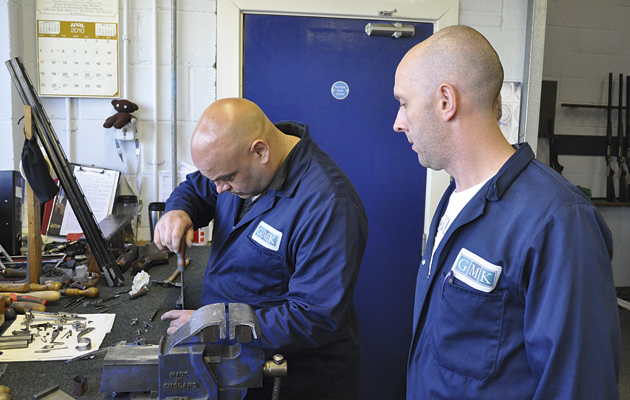Shotgun servicing costs little compared to the loss of a day's shooting. We tell you when and where to have your gun serviced.
SHOTGUN SERVICING BY A GUNSMITH
Many believe, rightly, that several of the problems mentioned warrant shotgun servicing by a skilled gunsmith. How often varies according to use. Chris Symonds is one of the most active general gunsmiths in the country and does a great deal of work for the London trade. He suggests that a “fair-weather” shooter should opt for a strip and clean every 18 months to two years (he charges about £150). If the gun’s used often in rain, the frequency of servicing might increase to once a season. And if it suffers a severe soaking, such as being immersed in saltwater when wildfowling, then it should be taken to a gunsmith immediately.
A normal shotgun service would including stripping the action and ejector mechanism completely, checking for wear, repairing as necessary, oiling and reassembly. The barrels and chambers are often polished and lead
and plastic residue removed from the bores. Symonds notes that the most common problems with side-by-sides are the strikers (firing pins), which he often replaces (he turns his own out of silver steel that is hardened and tempered). Ejectors mistiming create another common problem, as do top lever springs, which may suddenly break or become spongy over time, and weak mainsprings. Again, Symonds makes his own.
Typical problems with modern over-and-unders are not dissimilar, he notes. Chipped or dented firing pins are common with some makes, as are weak mainsprings; the latter tend to be cheaper and easier to replace than those in a side-by-side because they are usually helical rather than handmade V-springs.

A Beretta doesn’t necessarily need an annual service, but take it to GMK if it does.
Malcolm Grendon, a traditionally trained gunsmith, is head of the highly efficient, modern workshop at GMK, the Beretta im-porter. “We advise clients,” he told me, “to have the actions of their guns stripped and cleaned periodically depending on use [GMK charges £185 including VAT plus parts as required for standard production guns]. It would be wrong to say everyone needs an annual service for a Beretta. What is a real red flag, though, is when a gun becomes loose on the face of the action or one notes a top lever coming back beyond the central position. Then, immediate attention is required, as is any case of trigger or safety malfunction.”
Although Berettas are tough and reliable, they have the advantage of main bearing parts being available in various oversizes should they be required. There are, for example, three sizes of hinge-pin – GMK calls them discs – for the whole range (with the exception of the SO sidelocks, which require a custom-fitted disc should replacement become necessary). The conical locking bolts of the boxlock over-and-unders are also available in two sizes (plus 15 thou and plus 30 thou). The hinge-pins and bolts require fitting by a skilled operative (but they don’t always have to be replaced together); sears and internal springs do. Ejector springs are interchangeable.
Berettas, like most modern over-and-unders, have brazed ribs rather than the soft-soldered variety used in English barrels, so experience few problems with loose ribs. However, because they are vented, it is easier for the top rib to be dented, something that can be rectified fairly easily with a special tool. Grendon observes that cosmetic issues are often part of a thorough service: “We polish barrels flats and ejectors routinely and the monobloc flats can also be re-jewelled if required.” Beretta firing pins rarely break but, ”We do occasionally see cracks in stocks and fore-ends and these may be repaired or re-placed.“ Grendon makes the point that poor disassembly may cause unnecessary problems. Fore-ends are sometimes wrenched down carelessly over the front of the ejector work, damaging the wood. The correct pro-cedure is to pull the fore-end latch down, bring the fore-end a few millimetres off the barrels and slightly forward, then remove it.
Grendon notes the dangers of over-oiling and stresses the importance of using the correct lubricants. Traditional grease attracts grit, so his advice is to use a synthetic oil on the action knuckle and keep it lightly lubricated. Beretta barrels do not need routine oiling as they are hard-chrome-lined (as are Beretta chambers). He recommends keeping multi-chokes clean and lightly lubricated on the threads and stresses the importance of checking that they are securely tightened.





